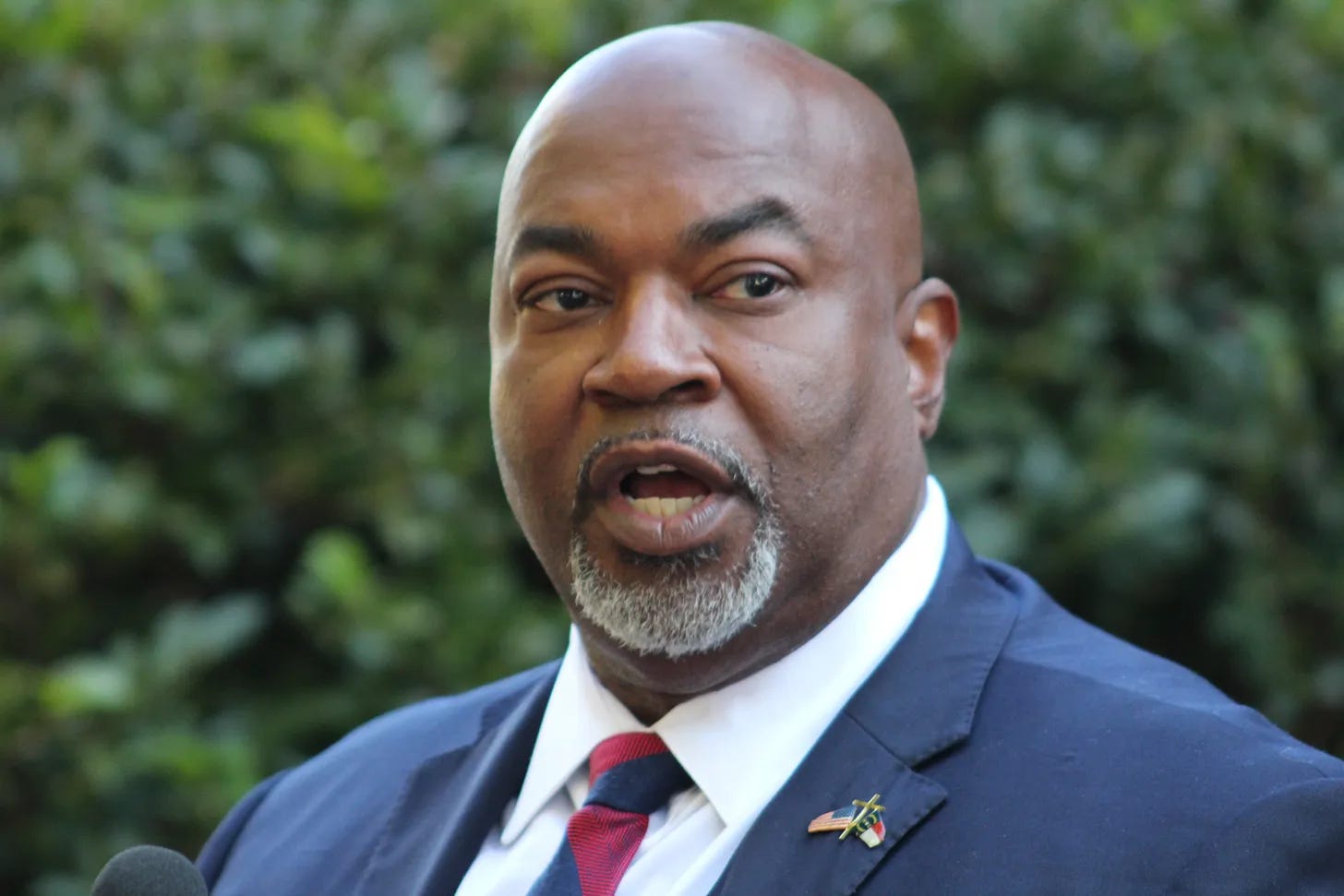With Cooper out of state, Robinson considering signing bill to provide Helene relief, expand GOP appointment power
Lt. Gov. Mark Robinson is considering signing Senate Bill 382. He is acting governor, with Cooper currently out of state.

With Gov. Roy Cooper out of state on Wednesday to encourage Congress to provide relief to Hurricane Helene victims, Acting Governor and Lt. Gov. Mark Robinson is considering signing a bill that would set aside $227 million for additional Hurricane Helene relief and substantially reduces the power of a number of incoming state leaders.
“The Lt. Governor’s office is exploring options to sign today’s legislation into law as soon as later this evening,” a source close to Robinson told Anderson Alerts. “He is acting governor and wants to get the needed aid to WNC immediately.”
WUNC also reported on Robinson considering singing the measure with Cooper out of state. Shortly after the reports from WUNC and Anderson Alerts, Robinson cleared the Senate gallery due to audience disruptions. During a brief recess, Robinson told reporters at WRAL that he wouldn’t sign the bill. Robinson signing the bill could’ve given Democrats greater likelihood of a successful legal challenge to the measure.
On Wednesday, Senate Republicans are set to approve a transfer of around $227 million from the state’s rainy day fund to the hurricane relief fund. But that money won’t go out the door until a future session.
The bill instead largely focuses on curbing the power of Gov.-elect Josh Stein, who soundly defeated Robinson in the governor’s race earlier this month, as well as other incoming Democrats.
Under the state constitution, the lieutenant governor has very limited powers. Chief among them are administratively presiding over the Senate and filling in as acting governor when the governor is out of state. With Cooper out of the state, Robinson is free to act on any legislation that reaches the Governor’s Office.
With Senate Republicans fast-tracking the legislation, the bill could be signed Wednesday night, which could very well be before Cooper returns to the state. Democrats could seek to slowroll the process. But under parliamentary Senate rules, each of the 20 Senate Democrats could speak for a maximum of 10 minutes. That would slow the process by three hours, which likely isn’t enough for Cooper to return to the state.
Cooper’s office didn’t immediately respond to a request for comment.
Frosty relationship
Robinson and Cooper have long had a frosty relationship, with Robinson in 2022 telling me the relationship was “nonexistent” and that Cooper never informs him when he leaves the state.
In the same 2022 interview, Robinson expressed both an openness and reluctance to taking action when the governor is out of town.
“There is no way that I would take a chance of doing something of that nature just to take a pot-shot at somebody,” Robinson said. “That would be cheap and beneath this office.”
One minute later, however, he added: “It would depend on the length of time and what was going on at that particular moment. I’ll just leave it at that and what was going on at that particular moment. We would play it by year and we would be completely fair and open and honest about anything that we would do.”
Over the past two years, Robinson has been reigned in by staff around him and also by the fact he couldn’t alienate more ideologically centrist voters as he was running for governor.
But on Nov. 5, Robinson suffered the worst loss of any gubernatorial candidate in North Carolina since 1980. Before that, half his office staff left.
With the election out the window and half his staff gone, there now appears to be nothing for Robinson to lose politically.
Wednesday appeared to mark Cooper’s first day out-of-state since Robinson’s defeat, presenting Robinson with his first opportunity to retaliate against Democrats. In signing the bill that could come before him, Robinson would be curbing the powers of many prominent Democrats who had opposed him.
What the bill does
Here are some of the policy ramifications of Senate Bill 382:
Prevents Gov.-elect Josh Stein from appointing members onto the State Board of Elections by transferring that authority over to Republican Auditor-elect Dave Boliek.
Makes the State Highway Patrol an independent agency and requires Stein to get the General Assembly’s approval for a five-year appointment
If a Supreme Court or Court Appeals vacancy emerges, Stein must fill it from a list of recommendations provided by the political party of the departing judge, thus preventing him from filling a potential GOP vacancy with a Democrat.
Removes the seats of Wake County Superior Court Judge Bryan Collins and Forsyth County Superior Court Judge Todd Burke. Collins and Burke have ruled against election law changes that GOP lawmakers have put forward over the years.
Prohibits Attorney General-elect Jeff Jackson from participating in lawsuits that undercut actions taken by the General Assembly. The bill says Jackson “shall not, as a party, amicus, or any other participant in an action pending before a state or federal court in another state, advance any argument that would result in the invalidation of any statute enacted by the General Assembly.”
Prevents Lt. Gov.-elect Rachel Hunt from chairing committees on energy issues. The bill also eliminates the Energy Policy Council, which has been chaired by the lieutenant governor.
Prevents Democratic Superintendent of Public Instruction-elect Mo Green from appealing decisions made by the Charter Schools Review Board.
Reduces the timeframe voters can “cure” their provisional ballots from nine days to three days. Provisionals tend to favor Democratic candidates and proved essential to Supreme Court Justice Allison Riggs’ efforts to overtake the lead of Republican Court of Appeals Judge Jefferson Griffin.
This is a developing story that will continue to be updated.



